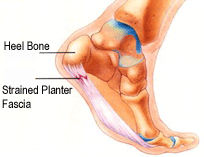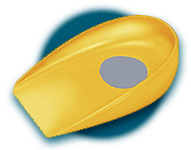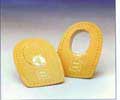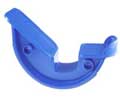Plantar Fasciitis Heel Pain & Football
May 13 2008 | Articles

Plantar Fasciitis or heel pain affects the foot by causing heel, arch and sole of the foot pain. This condition involves the painful swelling of the fibrous sheath that runs across the length of the foot. Termed as Plantar Fascia, this sheath extends from the heel bone to the metatarsal bones effectively covering the tiny muscles located at the sole of the feet. The Plantar fascia is extremely helpful in activities like walking and running. Once you ‘toe-off’, the Plantar Fascia contracts, becoming a lever that helps the foot exert force on the ground. Located on the arch of the foot, the Plantar Fascia is one of the fundamental structures responsible for providing stability.
The Plantar Fascia usually swells at the point where it meets the heel bone. Footballers can suffer from this condition due to over training or a sudden increase in football training.
Plantar Fasciitis Signs & Symptoms
Although Plantar Fasciitis starts with pain specifically in the inside of the heel, the pain typically spreads and may be felt up to the inside of the sole of the foot. The pain accompanies any physical activity and the heel pain will be worse in the morning, especially when taking the first few steps of the day.
A physician or a physiotherapist can diagnose the presence of Plantar Fasciitis by checking if there is pain upon touching the inside of the heel and/or upon pulling the toes up, a procedure that stretches the Plantar Fascia. To confirm the diagnosis, an ultrasound may be preformed in order to see if the Plantar Fascia has developed a much thicker appearance. In some instances, the heel pain may not respond to normal treatment. In such cases, an x-ray may be necessary to check for other conditions such as a bony spur on the heel bone or the presence of a fracture.
Plantar Fasciitis Treatment
What you can do
Since Plantar Fasciitis primarily involves inflammation, it can only be successfully treated when the cause of the swelling is correctly determined and addressed. For individuals who engage in a lot of football, the swelling is often due to overuse. In this case, rest is extremely significant since it will alleviate the strain in the Plantar Fascia and facilitate healing of the affected tissues.
In some instances, a problem with the biomechanics of the foot may be contributing to the symptoms of Plantar Fasciitis. The findings typically show that the foot may ‘over pronate’. This condition involves an excessive rolling of the inner arch of the foot in activities like walking and running. Such an instance will lead to increased stress to the Achilles tendon which, according to recent studies, will in turn cause more strain to the Plantar Fascia. The use of an insole such as the Dr Foot Sports or Dr Foot Pro Insoles that support the inner arch of the foot can help resolve this situation.
Any local inflammation or biomedical problem can be addressed by conservative treatments like physiotherapy. In this form of treatment, ice packs and doctor-prescribed anti-inflammatory tablets may be used to manage pain of the Plantar Fascia. Once the pain and swelling has subsided, the patient must help the Plantar Fascia return to its original alignment. This can be effectively done by pulling the toes towards the shin and through other exercises that stretches the Plantar Fascia.
Plantar Fasciitis may also be treated using a procedure called, taping. The application of the tape supports the Plantar Fascia and effectively reduces strain which can worsen the condition.
In 95% of cases, conservative treatments are able to address the swelling in Plantar Fasciitis. However, an injection of a mixture of corticosteroid and local anaesthetic may be helpful in instances where normal walking is already greatly affected by heel pain. Upon receiving the injection, the patient will be required to take a few days of rest. Gradual return to normal activities may begin shortly after.
In the event that six months of conservative treatment is unable to improve the conditions brought by Plantar Fasciitis, surgery may be considered an option. Although past surgical techniques were able to remove bony spurs from the heel bone and even release the Plantar Fascia from the heel bone itself, results are still fairly inconsistent. These invasive surgeries also can cause complications ranging from damage in the nerves to changes in the foot’s bio-mechanics.
Plantar Fasciitis Prevention
What you can do
Plantar Fasciitis is often linked to improper footwear. Football shoes used should be able to give the foot sufficient support. Use of inadequate footwear may increase strain on the Plantar Fascia which can consequently lead to pain and swelling.
To relieve stress on the plantar fascia, it is ideal to use insoles that support the inner side of the foot. These insoles can also protect the foot from unnecessary pronation (foot rolling over too much).
HEEL PAIN TREATMENT
Review:
Treat those sore aching heels.
Do you suffer from the morning heel pain or heel spurs? If so, the Heel Pain products range is for you. Our 100% super-shock absorbing soft silicone heel products can reduce your heel pain instantly. The result? Relief from those aching heels. The surprise is the price. Our heel products are both effective and affordable.

Read more about Heel pain products from £10 with Free Postage and Packaging
Other Treatment Options

Dr Foot Pro Insoles treat the underlying cause of heel pain, £23


Leather covered heel support for instant relief at £9.99 or the pro stretch plantar fascia stretcher at £25
Testimonials
“Relief with the FIRST STEP! I have been to 4 doctors for help with Plantar Fasciitis, and now heel spur. Have done the ice, wall stretching, physical therapy, awful painful cortisone shots, tried 7 or 8 other heel pain inserts and thought I guess I can try one more thing. I put the Dr Foot Pro Insoles in my shoe and had instant relief. I mean with the first step I did not feel the heel spur! Thank You!”
Mrs Richardson, Surrey
“In the mornings, I had experienced more pain in my left heel. The pain was sharp whenever pressure was applied. The Dr Foot Pro Insoles provided support to my heel where it was greatly needed. With the added support, the pressure and the pain have been noticeably reduced. Walking, jogging, or running is more comfortable – without the pain! “
Mrs Toole, London
“I am amazed and very grateful to you, I ordered my Dr Foot Pro insoles late yesterday afternoon via the Internet and they arrived recorded delivery this morning.
What an amazing delivery service you have, I just hope the insoles now help with my plantar fascitis.
Thank you again for such speedy service”
Sue, UK
“Just wanted to say that after trying so many different kinds of insoles yours seem to be helping me the most!I have a heel spur and you suggested the green pro insoles would help …they are helping!!
Thanks”
Anthea, Gibraltar
“Hi, my insoles arrived within a few days thanks!
I did as instructed with the insoles and wore them for a few hours for the first week, I felt like i was walking so strange at first, not at all convinced I could keep them in my shoes, then after a few days I forgot they were there and a week later I can walk for longer with no pain during the day or night i’m impressed!!!”
Dawn, UK
“I just wanted to say that these are brilliant. They have provided me with relief from heel pain instantly. They feel strange when you first put them on but after a very short while that feeling goes away. They changed my life.”
Mrs Moss, UK
“I have been suffering with Plantar Fasciitis for a few weeks, treating with regular cold water soaks and anti-inflammatory creams. I purchased a set of Dr Foot Pro insoles from yourselves which were delivered yesterday. The reaction was instantaneous. I can feel the insole, but it is not uncomfortable and the pain has gone. At weekends I am a football referee, in and around the Birmingham area, so my foot gets a fair amount of punishment. Thank you.”
Mr King, UK
Need heel pain treatment in the UK?
